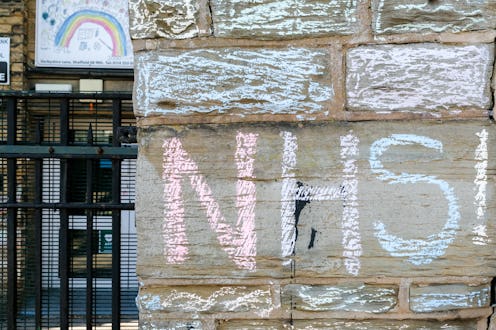News
5 Meaningful Ways To Help The NHS Cope During The Coronavirus Pandemic

From 5k runs to a 99-year-old walking sponsored laps in his garden, it’s clear the general public want to help the NHS staff risking their lives to keep the UK alive and well during the COVID-19 outbreak. But is fundraising for the NHS the most beneficial way to help staff and where is the money donating being used?
Since the outbreak, one of the biggest concerns our country has been facing is overwhelming the NHS. If it can’t run efficiently and safely then more people could lose their lives to COVID-19 or to other health complications. Already according to The Guardian, there have been 57 NHS staff deaths and it’s mostly ethnic minorities who are dying, accounting for 68% of those deaths.
But what’s happening to the NHS is far more complex than donating to charity alone can fix.
The National Health Service is funded by taxpayers money, making it a free service. But a decade of underfunding due to austerity and a growing and ageing population amongst other issues means the NHS was already under immense stress before the pandemic even began.
While the NHS isn’t a charity, they do have charities affiliated with them – NHS Charities Together is an umbrella of charities linked to individual hospitals, and this is where donated money from Run For Heroes is going. The donations, however, cannot be used for core” clinical services, staff salary or for life-saving Personal Protective Equipment (PPE), instead, it’s used for well-being packages, gifts, and helping pay for things like parking.
Speaking to Bustle, Sexual and Reproductive Health Doctor and writer, Annabel Sowemimo acknowledges donating items does boost staff morale and “people raising money, making things and donating items are incredible,” but she also reiterates that the NHS is not a charity and “should be funded properly through taxation and its staff should be adequately remunerated for our time.” She added: “the lack of resources in this pandemic has occurred due to mismanagement and people need to be accountable.”
Since the pandemic hit, the UK has been slow to react. In The Sunday Times investigation addressing the failings of the government to act, they report there will be an inevitable investigation into “why so little was done to equip the National Health Service for the coming crisis” and “why it took so long to recognise an urgent need for a massive boost in supplies of personal protective equipment (PPE) for health workers; ventilators to treat acute respiratory symptoms; and tests to detect the infection.”
While the onus shouldn’t be on the public and individuals to support and properly fund the NHS outside of taxes, understandably many will want to show gratitude. So if you still do want to help those working and at risk, here are five meaningful ways to show support.
1Stay Indoors
This may be an obvious one — but to stop overwhelming the NHS, and to save lives – staying indoors is key, you should follow the guidelines and take them seriously. Eleanor Studd Paediatric Nurse, working in London says although the clapping does boost morale at times, “the best way of people showing their support is to really listen to medical advice to stop the overcrowding of services, to ensure they can continue to operate safely.”
2Go To The Charity Of Your Choice Directly
The popular 5K Run for Heroes challenge circulating social media, started by runner Olivia Strong, has seen many people make their donations through Virgin. Nearly £5 million has been raised, with the funds going towards wellness packages, and travel costs for NHS staff. Virgin Money Giving usually charges a platform fee (which was only changed this week) and a payment processing fee. Instead, you can cut out the middle person, and go directly to the charity of your choice, that way they are getting all the funds you have donated.
3Donate To Other Underfunded Causes
Do your research. Can you donate to the charity affiliated with your local hospital? What exactly are the funds being used for? Are there any other grassroots organisations, and community charities who are still very underfunded that you could donate to? You can check the independent Food Network to see what grassroots food organisation you help. Places like Zoe’s Ghana Kitchen are providing 150-200 hot meals per week to the most vulnerable in London.
Eleanor explains that food discounts and free meals do really helpful staff, “this does make us feel valued and supported and can ease some pressure of constantly thinking about lunches in busy times.” Manchester’s Finest are taking donations to provide hot meals for NHS staff, through Feed Our Heroes. Nationally, Feed The Frontline are helping to also deliver food.
4Donate To Causes Run By Healthcare Workers for Healthcare Workers
Nobody is going to know what healthcare workers need more than those working in hospitals right now. Masks for NHS heroes, set up by Dr Mona Barzin, Dr Salaj Masand, and Mr Ravi Visagan, are crowdfunding for PPE to be donated “directly to the NHS frontline.”
5Volunteer
If you are able to and want to, you can volunteer your time. Although recruiting for the NHS volunteer scheme is temporarily on pause there are many ways to volunteer. If you live in London you can search via the London Gov website for opportunities if you live in Manchester, Manchester Community Central offer guidance, for Bristol CanDoBristol, City Lifeline for Newcastle and for Wales check out Volunteering Wales.
This article was originally published on